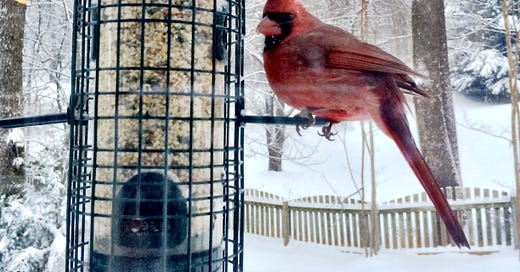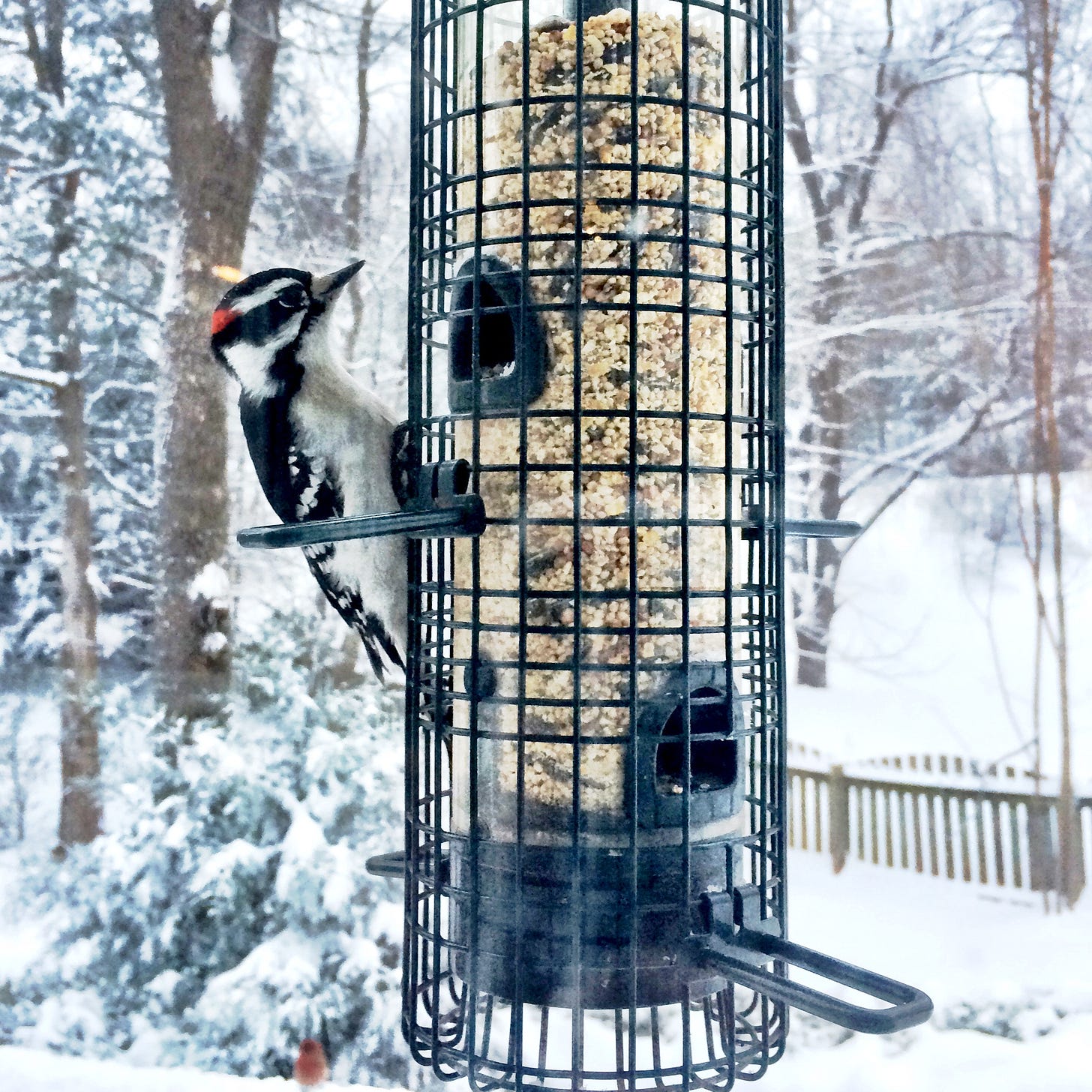The Night Bird
We have a night bird.
Every night for the last couple of weeks, this fucking bird sings from about midnight to 4 AM. We have a sound machine going, and it’s not enough to drown out his avian joy. My neanderthal brain hears bird song and registers “morning” — and it’s impossible to get back to sleep.
But can I actually complain about BIRDS? They’re birds. They are sweet little modern dinosaurs who bring fluttery cheer.
And yet here we are.
Here is some 1 AM audio I recorded so you can hear my night bird — and me losing my mind:
I’ve never experienced this before. Why the hell was he awake and shouting — are his circadian rhythms off? Is he visually impaired? Is he a European bird who is just visiting and has not yet adjusted to the time zones?
Thanks to Threads, I learned that he’s a mockingbird just searching for a lover. And it does not seem to be going well for him.
I had a bird-watching phase about a decade ago. The feeder in the window of our kitchen was quite the hot spot. I had a book called Birds of Virginia, with an index in the back where I’d check off all the birds I had seen. I liked learning about the seasons different birds would show up. I knew the exact week the hummingbirds would migrate through to drink the sugar water I boiled for them. I had both suet and seeds and knew the mourning doves couldn’t come to the feeder, but they liked the seed that fell to the ground. My feeder was likely so popular because I was the sucker who bought ridiculously expensive birdseed from a local birding boutique, while everyone else had the normal stuff from the Tractor Supply.
The feeder itself was a feat of modern engineering. The Squirrel Buster Classic had a metal cage that would drop down and cover the seed access if anything heavier than a woodpecker landed on it. Please enjoy this slow-mo video of a squirrel being busted, feeding the mourning doves below.
As my knowledge of birds grew, I became a person who shared bird stories. When I noticed starlings at my friend’s bird bath, I excitedly told her about another friend, who ended up with an injured starling, named Pickle. Starlings can mimic human voices, and Pickle would scream, GOOD GIRL PICKLE until someone gave her a treat. I think this is a brilliant way of reconfiguring our cultural reward structure, and I think many of us can and should learn a lesson from Pickle.
Bird watching has always been a popular pastime, but the hobby of birding soared during the pandemic (thank you, I thought that wordplay was clever too, GOOD GIRL PICKLE) and it speaks to an often overlooked truth: there is cool shit right in front of us.
This sort of thing is delightful to me because it runs contrary to a psychological concept called hedonic adaptation. This is the tendency to get used to the good things in our lives, and take them for granted — and it’s one of my least favorite things about being human.
When we move into a new house, or get a promotion, or meet a cute person - we are so happy! And we are sure this feeling will last forever! Then we slowly watch that joy fade as we get less enamored with the house, or the job, or the cute person. We focus on the water heater ticking, or the additional work hours, or the fact that they have a really weird sneeze.
But when you get interested in birds — every time you see that entirely bland and super common house finch, you choose to notice, appreciate, and engage in that moment. You get curious about the thing that is right in front of you.
This is the practice of Beginner’s Mind and it’s a fundamental concept in meditation and yoga. It’s all about taking in each moment like you’ve not been there a million times, even if you have. Present-moment awareness, curiosity, and gratitude are the keys to combating hedonic adaptation.
The early days of the pandemic coincided with Jeremy and I leaving the house with the bird feeder and moving downtown — and there are pretty much just pigeons around here. I knew that the activities around the Squirrel Buster Classic would be one of the only things I missed about our suburban life.
And I do miss it.
I’ve found other ways to fight back against hedonic adaptation and practice being present in an analog way — mindful walks, journaling, and embroidery are just a few. But I still miss the feeder.
Oh, and I’ve discovered another reason it’s fun to feed the birds: if their mouths are full, they shut the hell up.
Here’s what else happened this week:
Dear NPR:
Please correct this to “This sound could improve your mental health IF YOU HEAR IT DURING THE DAY.”
What I read
When I Became a Birder, Almost Everything Else Fell Into Place
(Thanks, S!)
“It’s easy to think of birding as an escape from reality. Instead, I see it as immersion in the true reality.”
What else I listened to
I have a problem when it comes to listening to guided meditations to go to sleep. It feels like work to me, because as I listen, I think, what a great concept to share with my students, so I stop the meditation, open my Notes app, write it down, and then I’m fully awake.
I Can’t Sleep Podcast on Insight Timer turns out to be the solution. Benjamin Boster has this delightfully dull voice and he reads Wikipedia articles about mundane things. This episode taught me about utility poles and it knocked me out. But it’s also interesting at the same time, and I find I do know more about utility poles now.
This might not work for everyone, though. A dear friend of mine brings connectivity to underserved communities, so his work is literally utility poles. So this would likely feel like work to him. (Don’t listen to this one, K.)
What I watched
The New Look (Apple Plus)
“Creation was survival.”
I didn’t expect a show about haute couture would be my thing. (My husband recently noted that my wardrobe pretty much consists exclusively of Mission Flexible logo merch these days) but this show is fascinating and apparently, mostly true. It looks at the ways that French fashion designers like Christian Dior and Coco Chanel navigated Nazi-occupied Paris, the demands that they design for Nazi wives, and the life-or-death moral dilemmas they faced.
What I posted
Yoga for the Low Back - for Blue Mala members!
If you’re not yet part of our pay-what-you-can community, why not? It’s a wonderful way to create a burnout prevention routine and connect with others — all at whatever price you choose. Click below to find member-only content like yoga, meditation, and all that other stuff you know will help.
Thank you for reading, friends. I hope you notice and appreciate the little things. Like a QUIET bird sitting on a utility pole.
Much love,
~Lisa








